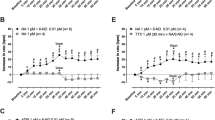Abstract.
The positive chronotropic effect of a high concentration of 5-hydroxytryptamine (5-HT) in rat isolated atria results mainly from a tyramine-like mechanism and is linked to an increase in cAMP production by an indirect stimulation of β-adrenoceptors. Using this preparation, we have compared the action of tyramine and 5-HT. The tyramine (0.15 μM)-induced increase in atrial rate was suppressed by atenolol (a β1 -blocking drug) and by nadolol (a β1 β 2 -blocker), while the positive chronotropic effect of 5-HT was reduced by atenolol and suppressed by nadolol. The 5-HT-induced elevation in cAMP was unchanged in the presence of atenolol and abolished by nadolol. The involvement of β2 -adrenoceptors in the effects of 5-HT could result from competition between 5-HT and noradrenaline at the β1 -adrenoceptors that results in a fixation of noradrenaline on β2 -adrenoceptors.
Similar content being viewed by others
Author information
Authors and Affiliations
Additional information
Received 30 September 1996; received after revision 15 November 1996; accepted 5 December 1996
Rights and permissions
About this article
Cite this article
Davy, M., Grandcourt, O., Midol-Monnet, M. et al. 5-Hydroxytryptamine and β-adrenoceptors in rat isolated atria. CMLS, Cell. mol. life sci. 53, 263–266 (1997). https://doi.org/10.1007/PL00000601
Issue Date:
DOI: https://doi.org/10.1007/PL00000601



